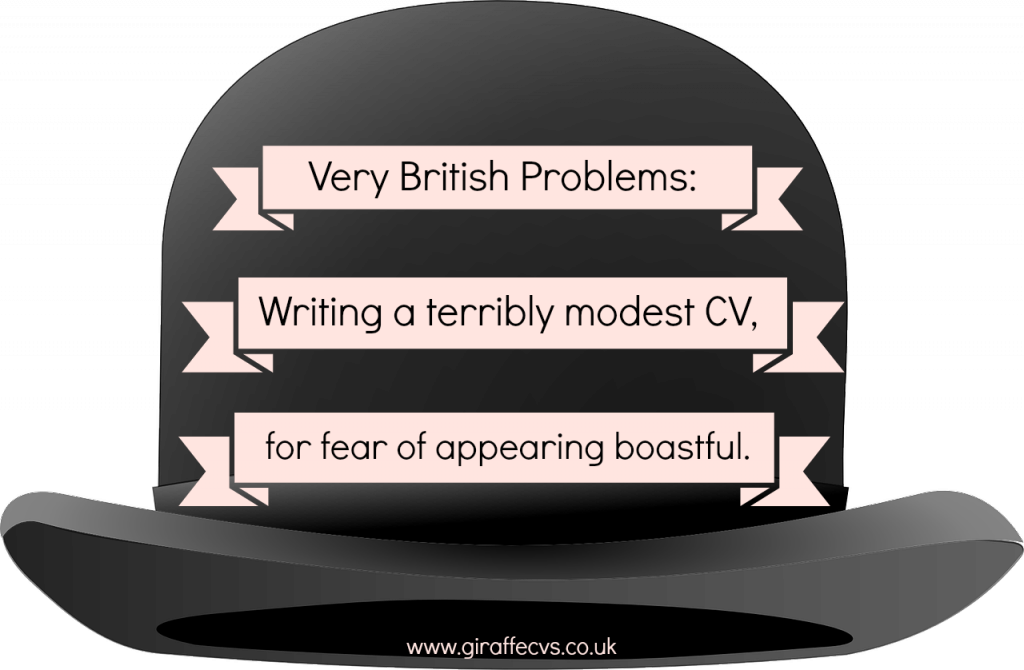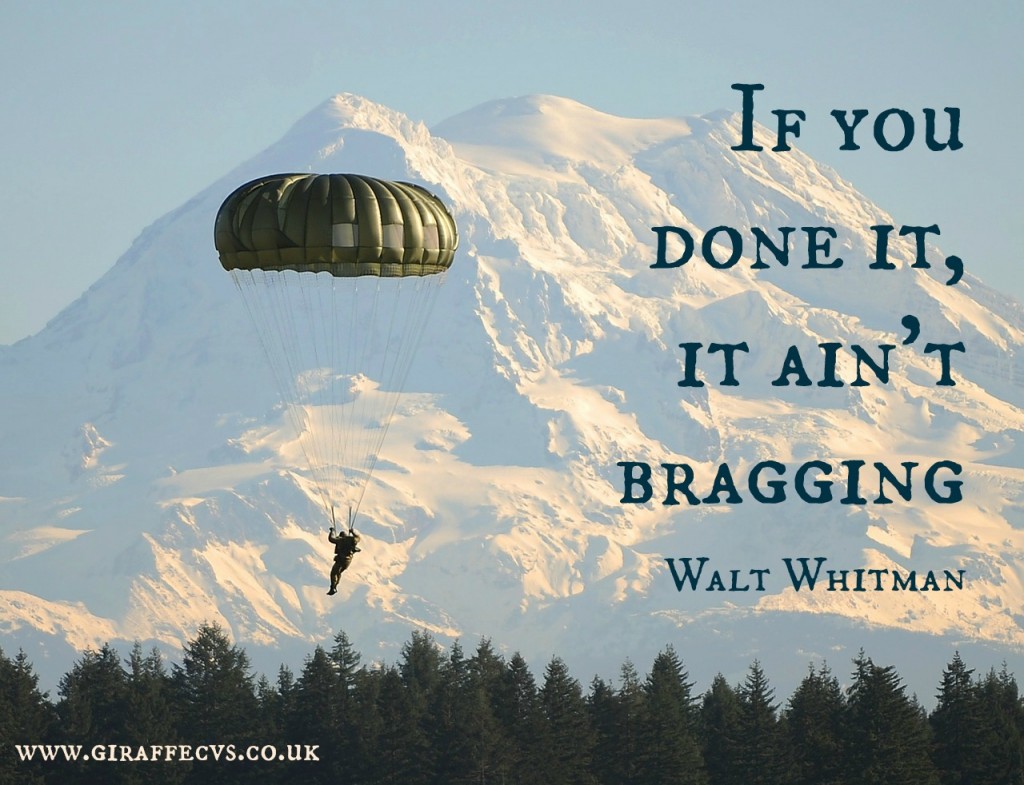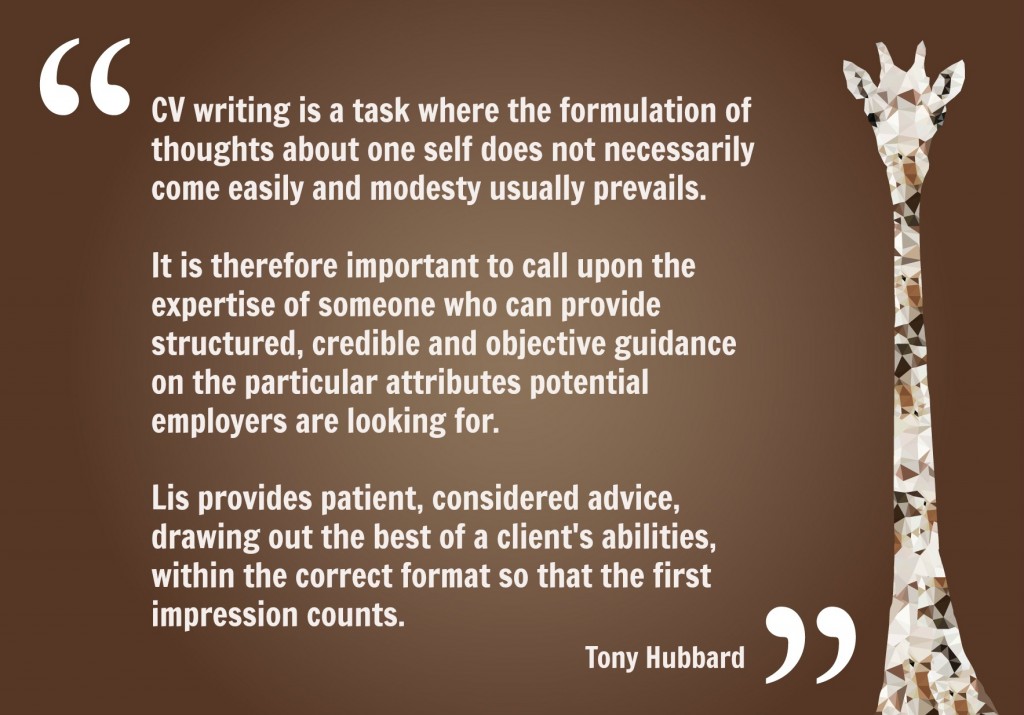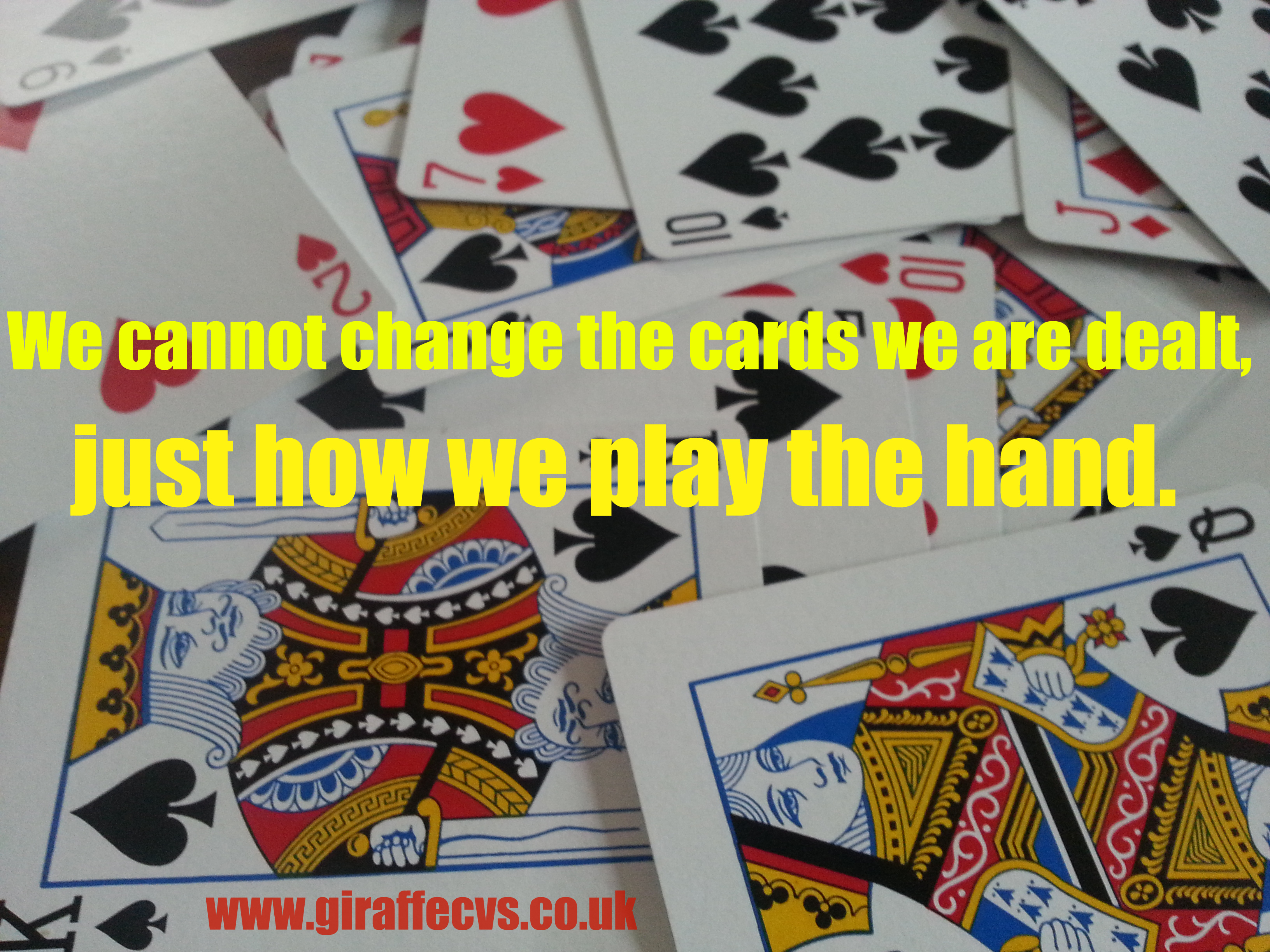
by Lis McGuire | Nov 4, 2013 | CV tips, News
Writing your own CV often engenders a slight-to-moderate ‘cringe factor’, a feeling that it goes against the very grain of your being to ‘big yourself up’ or self-proclaim your skills, experience and achievements.

The popular refrain to this sentiment is, ‘If you don’t say it, then who will?’
True enough. However, for many, it doesn’t serve to justify the self-promotion that is part and parcel of CV writing.
This week’s blog provides seven modesty-busting strategies for writing your own CV.
I hope these points will give you a new way to think about writing your CV and make the whole process sit easier with your conscience.
#1: Imagine you are a CV writer
Many of us have a self-deprecating streak a mile wide, making it nigh on impossible to write about our own skills and experience in a positive, impartial and alluring manner which will entice a target recruiter to call us up.
One strategy is to imagine you are actually writing a CV for someone else who demonstrates the same experience, skillset and potential as yourself. Ask yourself: If I was writing this about someone else in my peer group, would it seem relevant and justifiable? See? No cringe factor!
Remove yourself from your inner dialogue (Am I good enough? Can I really justify this? How embarrassing IS this process?), and consider your CV content from an impartial angle. You’ll be surprised how it starts to flow.
#2: If you done it, it ain’t bragging
As American poet, essayist and journalist Walter “Walt” Whitman famously said, “If you done it, it ain’t bragging.” When writing about your experience and achievements for your CV, consider the following:

Is it true?
Can I back it up?
Would my peers agree that I have experience in this area?
Would my colleague at the same level as me have any problem stating this on his/her CV when updating his/her CV?
(I doubt it!)
#3: Draw factual inspiration
If you are floundering for what to say on your CV, why not consult existing collateral such as past appraisal documents, case studies, client proposals, etc.? These may include references to your achievements and outline your contribution to each distinct job role.
#4: Show and tell
Determine what qualities, skills and experience your target recruiter needs to see, then work out a set of credible examples to back up your claims. Quantify statements, wherever possible, to give depth to your  assertions.
assertions.
Considering your online presence for a moment, LinkedIn recommendations are a great way to enhance your credibility. By requesting and featuring recommendations on your LinkedIn profile, you can showcase your contribution and reputation. In a similar way, using LinkedIn’s projects feature, you can link with other professionals within your network who have worked on the same initiatives, validating your CV.
#5: Always look on the bright side of life
Some of my customers are hesitant about including key projects because the projects didn’t come to fruition, often for reasons beyond their control. I always tell them to look on the bright side and ask, ‘What did YOU do?’
The initiative may have been called off, but their involvement and contribution remained the same, whether they established the project in its early stages or gathered data which informed a senior level decision to call the whole thing off.
#6: Don’t hide behind what ‘we’ did
 Users of our free CV review service often hide behind group activities to lessen the ‘cringe factor’ of writing about their own experience and achievements.
Users of our free CV review service often hide behind group activities to lessen the ‘cringe factor’ of writing about their own experience and achievements.
We say to them, ‘Hey, you, come out from behind there.’
State simply what YOU did – that’s what the recruiter wants to see.
#7: Seek help from a professional CV writer
There’s a lot to be said for letting a professional get down to the nitty gritty of writing your CV. To set the record straight – I’m not any sort of sycophant. It’s not in my nature to give undeserved compliments, whether to friends, family or my customers. I just tell it as I see it.
One of my recent customers summed it up perfectly when he said, “CV writing is a task where the formulation of thoughts about oneself does not necessarily come easily and modesty usually prevails.” Appointing an impartial professional CV writer can make all the difference.


by Lis McGuire | Sep 17, 2013 | CV tips, Graduate CV tips, News

With a two-page limit, careful planning is essential to optimise your use of space.
Imagine you have some sand, pebbles and rocks to put in a jar. If you put the sand and the pebbles in first, you will never manage to cram in the rocks, they simply won’t fit. The sand and pebbles will have occupied valuable space where the rocks should be placed to promote your key skills and experience.

If you think of the rocks as the really important messages that you must
deliver on your CV, then these simply must go in first, on page one. Prioritise your key messages according to what the recruiter needs to know – other information is just white noise.

Pebbles, representing important information, should go in next, fitting around your rocks.

Finally, you can pour the sand, representing the minor details, over the
top, seeing where it can squeeze and fit between the gaps.
Four ways to work your two page CV to show the recruiter that you rock:
1. Jot down a shortlist of the projects, skills and achievements that will rock the recruiter’s boat. Use these as the focal points for your targeted CV.
2. Customise your layout to work each opportunity – bring the most important and relevant sections to the forefront. If you need to sell yourself on education, one particular job, a key project or even experiences outside the workplace, then make sure it is up there on page one.
3. Add a Key Skills section which speaks the recruiter’s language in terms of keywords. Allow them to tick, tick, tick off the job requirements and place your CV in their yes pile.
4. Ditch the unnecessary details. Information overload can detract from the value of what you are saying. Pick your important messages and make sure they shine through. We admit, it can be hard to let go of achievements from your earlier work history, but if the recruiter isn’t going to be interested, then what is the point of including them?

by Lis McGuire | Aug 27, 2013 | Career change tips, CV tips, News
Are you writing your own CV, but not sure how to play your cards right?
Read these top tips to write an ace CV which trumps the competition and enables you to secure that all-important interview.
Organise your hand
Just as when you are playing a card game, one of the first things to do when writing your CV is to organise your hand.
In a card game, once you have been dealt your cards, it is good practice to file hearts with hearts, diamonds with diamonds, clubs with clubs and spades with spades. This brings clarity to your game, and the same is true of an organised structure in your CV.
Set out clear, well defined sections (for example, Profile, Objective, Key Skills, Experience, Education/Training, Additional Skills) which will enable you to organise your skills and experience in a logical way. This will make it easier for you in writing your CV and easier for the recruiter who is reading your CV.
Learn to play the hand you’ve been dealt
No-one can honestly claim that they’re perfect in every way, which means that you’re in the majority if there are aspects of your career that you’re unhappy with mentioning on your CV. This could be a period of unemployment, illness, a job you took which represented a step back or time spent in temporary contracts when you were seeking a permanent role.
Even if you feel that the deck has been stacked against you, don’t overplay it. I’m not advising you cover it up, but you don’t need to pour out your woes on your CV. My advice is to lay your cards on the table, simply stating the facts and no more. Call a spade a spade and be done with it. As they say: once you’ve accepted your flaws, no one can use them against you.
In many cases, an element which is causing you worry won’t cause the recruiter to bat an eyelid. Life happens. If your skills and experience are the right match, most will be more interested in what happens next.
Never bluff
If you are someone who likes to ‘play their cards close to their chest’, you may be tempted to leave off an element of your career history that you are uncomfortable with or you may decide to take credit for something that wasn’t really your achievement. After all, who is going to call your bluff?
The saying goes that ‘the truth will out’ and, certainly, building a CV that omits key facts or includes untruths can lead to a ‘house of cards’ effect.
Don’t be tempted to fudge your dates or embellish the facts, it will leave you with a residual worry that at any time your house of cards may topple and fall. Honesty is always the best policy.
Jack of all trades?
Some people show a tendency to ‘hedge their bets’ when writing their CV. These people aim for a generic overview which may catch the eye of many and open up a new opportunity, rather than a tailored CV which will definitely appeal to one specific target.
If you show yourself as a jack of all trades, chances are that the recruiter may see you as a master of none. Safe in the knowledge that you have many strings to your bow, you can afford to target and tailor your CV to each opportunity. Although it may be more time-consuming, it’s worth doing to get that all important first foot through the door.
How to play when you are holding all the cards
You’ve got great experience, your skills are exactly what the recruiter is looking for and you are pretty sure you are a cultural fit too. But does this jump out at the recruiter when they are reading your CV?
Even if you are fortunate enough to be holding all the aces, it is still important to plan your strategy to ensure your CV doesn’t get lost in the shuffle.
I have seen CVs written by individuals with FANTASTIC experience, yet the wording and presentation of their CV lets them down. Your CV must convey your skills, expertise and experience in a professional, written, well-structured and visually appealing way. If you don’t do this, someone else with a sharper CV may get the interview you deserve.
“A great social success is a pretty girl who plays her cards as carefully as if she were plain.”
Anything you can do to make it easier for the recruiter will pay dividends. As a minimum:
– Capture the interest of your target recruiter by tailoring your CV in light of identified job requirements, selecting and highlighting relevant experience and skills
– Use a structured and focused format with well-defined sections so that the recruiter can easily find the information they need
– Use clear, consistent formatting that doesn’t distract from the content (font size, type face, alignment etc.)
– Present your CV with enough white space to make it easy on the eye
Don’t be afraid to change suits
Things change. Your aspirations change, the market changes, your skills change as they evolve. So why would your CV stay the same?
The ground is continuously moving under our feet, whether we are propelling ourselves forward or being carried along by the tide. As such, you cannot afford for your CV to be a static document – it needs to be regularly updated and rebranded to encapsulate your ‘here and now’. And if that means a restructure, refocus or complete rewrite, then so be it.
Keep a card up your sleeve
If you are struggling to decide how much detail to give on your CV, then bear in mind the tactics used by professional card players. These players give just enough away to reel their competitors in, so that they are encouraged to engage and place their bets. Your CV should strive for the same, to reel in the recruiter so that they want to meet you and find out more. State your skills, experience and achievements on your CV, by all means, but when assessing whether to include the finer details, think to yourself ‘Does the recruiter need to know this now?’ If not, you can probably wait until the interview to explain further.
“Life is like a game of cards. The hand you are dealt is determinism; the way you play it is free will.”
If you feel like a novice or a bit rusty when it comes to how best present the hand you’ve been dealt, contact us at enquiries@giraffecvs.co.uk for our expert advice.

by Lis McGuire | Aug 19, 2013 | CV tips, Graduate CV tips, News, Working with a CV writer
Consider your CV not as an expense but as a means to raise your game, your profile, your confidence and your salary.
Here are seven reasons why investing your time, effort and hard-earned money in a great CV will pay dividends:
1. A GREAT CV creates the right mindset
A professionally written CV really does put you in the right frame of mind for your job search. If you look good on paper, you’ll feel good about yourself, about your skills, your experience and what you have achieved. If your head is in the right place, and you feel confident and upbeat about your offering and your prospects, you’ll give out a positive vibe. As they say, self-confidence will get you more dates than simply being attractive – self-confidence IS attractive.
2. A GREAT CV reduces the legwork in your job search
A targeted, well-written and attractively presented CV will reduce the legwork in your job search. You could continue to use your old CV, apply to hundreds of job adverts and, sure, at some point, you may get a response. Maybe in a month, maybe in a year… who knows? If you’d rather get results now and save yourself hours and hours of precious time, then a professionally written CV is worth the investment.
3. A GREAT CV puffs up your chest with pride
Customers often say to me, ‘I didn’t realise how much I had actually achieved, until I saw it all written out on paper’. Writing a great CV gives me a warm feeling but, more importantly, it gives the individual concerned pride in their accomplishments to date. Week to week, year to year, there may be certain projects or challenges that give you a sense of achievement, but it’s not often you get to review all of your career highlights in one go. It’s a revelation!
4. A GREAT CV flexes your employability muscle
If you put forward the best possible representation of your professional self, you can truly test what the market thinks you are worth. A confident summary will position you in the recruiter’s mind – if you recognise your own value, then others will consider you as someone who can command respect and a salary commensurate with what they know they can offer. Test it out and see just how strong you are.
5. A GREAT CV creates a buzz of excitement
A great CV can give impetus to your job search – you’ll be excited about it, you’ll want to share it and let people know what you have to offer.
If you have targeted your new CV to meet the requirements of a particular opportunity, your excitement will spread to your recruiter, who will be thrilled that you have made it easy for them to put forward a suitable candidate for their latest vacancy.
If you use your new CV as the basis to update your LinkedIn profile, your professional network will suddenly become aware of your skills and experience. They may think they know you already, but a professionally written CV can uncover new insights and present you in a new light. Once they are fully aware of what you have to offer, the next time a relevant opportunity arises, they are more likely to think of you.
6. A GREAT CV offers a firm footing for the future
Whether you are just starting out or making a considered move from one role to another, your first step forward can be everything. Get that first job right and everything can roll from there. A new job can offer extensive learning opportunities (both on-the-job and through formal training), a chance to build and leverage a strong professional network and even develop prospects you never imagined you’d have.
A compelling CV is vital to secure that ideal job. It’s worth the effort to write one as the rewards could be beyond your wildest imaginings. If you put out a lacklustre CV, chances are that you’ll secure a lacklustre job. You are worth more than that. So go all out and choose the best version of your future with a first class CV.
7. A GREAT CV increases confidence, helping you to stand tall
I’ve said it before, but this is worth repeating as it really is true, if you feel confident, you will stand straighter. If you stand straighter, you’ll stand head and shoulders above other applicants.


by Lis McGuire | Jul 30, 2013 | Career change tips, CV tips, Graduate CV tips, News
If you think you are nearly there with your CV, then well done – we know it’s not easy!
Why not use these 25 questions as a simple sanity checklist to shape your final edit?
Have you written your CV with your target audience’s needs in mind?
Do the format, layout, content and key messages reflect the interests and mindset of the person likely to read it?
Who does your CV say you are? Ask a friend without disclosing your aspired identity.
Is it clear what your objective is in submitting the CV?
Can your target audience easily spot what your main selling points and experience are?
Is your CV attention-grabbing, reflecting the short amount of time the recruiter has to consider it?
Is the most important and relevant information for this particular opportunity there on the first page?
Does your experience section clearly identify the value you can bring through tangible results and quantifiable achievements, rather than dull descriptions of duties?
Does your CV represent YOUR achievements, or are you hiding behind what you did as a team?
Are your accountabilities and deliverables factual, concise and clear for each of your roles?
Are you confident discussing each point at interview?
Does your CV talk the recruiter’s language in terms of keywords?
Are there any mistakes in your spelling, grammar or punctuation?
Is it an easy read, both in terms of skim reading and reading it in-depth?
Does it contain any irrelevant information?
Does your content flow?
Are there any inconsistencies that don’t add up?
Do all your dates stack up?
Are there any information gaps that leave readers guessing?
Are any gaps explained in a concise and factual way?
Is your tone confident or are there any doubting demons lurking on your two pages?
It is two pages, right?!
Is the formatting consistent and appealing, making your CV easy to read?
Are there any layout inconsistencies that will distract the reader from your key messages?
Is your file saved in a format that the recruiter can open?
If you’ve answered yes to all of these questions, it sounds like you’ve done a great job!
If you need any help with your CV please contact us at enquiries@giraffecvs.co.uk.

 assertions.
assertions. Users of our free CV review service often hide behind group activities to lessen the ‘cringe factor’ of writing about their own experience and achievements.
Users of our free CV review service often hide behind group activities to lessen the ‘cringe factor’ of writing about their own experience and achievements.











